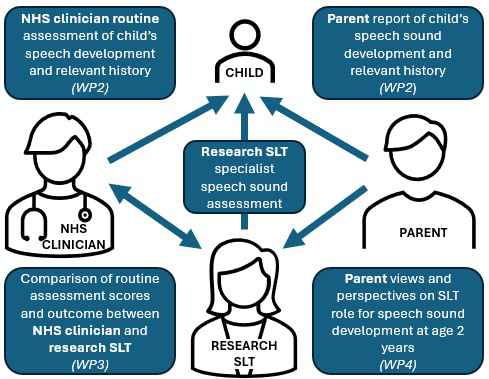PROSPER: Improving Speech Outcomes for Very Preterm Born Children in Wales
Funded by Health and Care Research Wales (HCRW), the PROSPER study is led by HCRW Advanced Fellow, Dr Sam Burr.

This research aims to improve speech outcomes for the 365 children born very preterm (VP) (before 32 weeks’ gestation) in Wales every year.
These children are at increased risk of having difficulties learning to speak. Some of them have a speech sound disorder. Speech sound disorders can make it hard for children to be understood and they may sound different to their friends. If their problems persist, they are less likely to do well in school, and may struggle to make friends or get jobs in adulthood.
There are some extra challenges that may make things even harder for VP born children.
Firstly, they have different experiences in the first 12 months of life compared with children born at term (after 37 weeks' gestation). At the moment, we don't know much about the impact these experiences have on how VP-born children learn to talk.
Secondly, children with speech difficulties are not usually seen by NHS speech and language therapy services until they are about four years old, or sometimes older. This means children who need the most help can wait longer to get it.
It is important that health professionals are able to identify these children as early as possible so they can have help.
We know the earlier these children get help, the better they do. This will benefit the child as they will be easier to understand and there will be less impact on their education and social development. This will also save money for the NHS and wider society by reducing the burden on social care.
Parents of VP-born children and the clinicians who support them have told me that this is a priority area of research for them.
How will this research help?
To tackle this problem, this research will lead to new information that will help to make sure that NHS health and care teams have the skills and knowledge they need to monitor and support the speech sound development of VP-born children from an early age.
This PPI and stakeholder-informed research comprises four Work Packages (WPs), to address the following research questions:
- What are the characteristics of speech sound development in VP-born children compared with children born at term in a population sample? (WP1)
- What are the characteristics of speech sound development in a clinical sample of VP-born children at 2 years (corrected age) in Wales (WP2)
- Is current clinical practice in Wales effective in identifying VP-born children at 2 years (corrected age) who are at highest risk of SSD later in childhood? (WP3)
- What are parent’s experiences and perspectives on SLT involvement in NDFU care for VP-born children in Wales? (WP4)
First, we will look at information from a large study in Bristol from the 1990s to help us understand the differences between speech development in VP-born babies and babies born at term (WP1). This will help us understand what differences there are and whether VP-born children are at higher risk of speech sound difficulties.
Then we will know how to spot these earlier in childhood, and they will get help earlier. This will mean their speech difficulties don't get in the way of their learning as much as if they had to wait until they were older. This will lead to better life outcomes for the child and their family. It will also mean we can identify children who are not likely to need help. This will save the NHS money and make sure that resources are focused on the children who need the most help.
Next, we will work with an NHS clinical team in Cardiff, who see VP-born children when they are aged two years old. This is an important age for speech development. We will collect information about the children's speech (WP2) so we can understand what this looks like in more detail and compare it with what we learnt from the Bristol study (WP1). We will also collect information about how the clinicians assess speech at the moment (WP3). Importantly, we will work with parents to understand their views about the role of speech and language therapists in the 2-year-old assessments (WP4).
We will share our findings with organisations like the Welsh Government so they can make sure that NHS services are effective in helping VP-born children to achieve their potential.

Meet the team
Contact us and mailing list sign-up for PROSPER
Email prosperstudy@cardiffmet.ac.uk for more information about the study or to be added to our mailing list.
